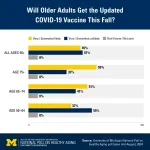(Press-News.org) COLUMBUS, Ohio – Americans who say they expect to “never retire” are more likely than others to score low on a measure of financial knowledge, a new study shows.
In a national survey, 20% of those who missed all three financial knowledge questions said they expected they would never retire, compared to 12% who answered all questions correctly, who said they’d likely work well past retirement age.
The study also found that those who were overconfident in their financial knowledge (and those whose low levels of confidence reflected their knowledge) were more likely to say they would never retire.
The findings, combined with other research, suggest that many people who say they will never retire aren’t saying that because they love their jobs and want to continue working indefinitely, said Sherman Hanna, co-author of the study and professor of consumer sciences at The Ohio State University.
“If you’re not knowledgeable about finances, it suggests that you don’t know what your financial situation is, and you may have no idea when you can retire,” Hanna said.
“Saying they’re never going to retire may be for some people a way of saying they have failed to prepare for retirement.”
The study was published recently in the journal Financial Services Review.
The findings have important implications for the way experts evaluate how many Americans are adequately prepared for retirement.
Many analyses of the projected retirement adequacy of American workers assume that those saying they will never retire will end up retiring at about age 70. But in a previous study, Hanna and his colleagues found that many of these “never retire” workers will actually drop out of the workforce at a much younger age – suggesting they might stop earning a steady income before they’ve done enough to shore up their finances.
“It means our projections of the proportion of workers on track for an adequate retirement might be too optimistic,” Hanna said. “Many of those who say they will never retire may not know enough about their finances and are not working toward a financially successful retirement.”
The researchers used data from the 2016 and 2019 Surveys of Consumer Confidence, sponsored by the U.S. Federal Reserve Board. Their final sample included 4,607 households in which the head of the household was aged 35 to 60 and was working full time.
The three questions in the SCF that measured financial knowledge – called the “Big Three” by researchers – relate to compound interest, real rates of return and risk diversification.
Findings in this study found that the more questions participants got wrong, the more likely they were to say they expected to never retire.
The survey also asked participants to rate their own financial knowledge on a scale from 0 (no knowledge) to 10 (high knowledge).
Of those who said they weren’t financially knowledgeable (levels 0, 1 or 2), 30% expected to never retire, more than twice the 14% of those who believed they were very knowledgeable (levels 9 and 10).
The researchers also rated the financial confidence of participants – and whether they were overconfident or underconfident – by comparing their subjective ratings of their financial knowledge with their actual scores on the financial knowledge questions.
Results showed that 17% of those who were overconfident in their financial knowledge expected to never retire, higher than the 12% who had appropriately high confidence in their financial knowledge.
The findings suggest that financial planners, counselors and educators need to have a clear understanding of what it means when people say they expect to never retire, Hanna said.
“We need to evaluate those who don’t expect to retire to ensure they have the appropriate level of financial knowledge and confidence to help them make plans for their post-working life,” he said.
Other co-authors of the study were Zezhong Zhang and Lei Xu, both doctoral students at Ohio State.
END
Why saying you’ll ‘never retire’ may be a warning sign
Low financial knowledge linked to not planning for retirement
2024-09-23
ELSE PRESS RELEASES FROM THIS DATE:
Study reveals high rates of seafood mislabeling and ambiguous market names in Calgary, Alberta, highlighting species of conservation concern
2024-09-23
A new peer-reviewed study published in PeerJ Life and Environment has uncovered alarming levels of seafood mislabeling and the use of ambiguous market names in Calgary's seafood market, often concealing species of conservation concern. This research marks the first Canadian study to investigate both invertebrate and finfish mislabeling and the implications of unclear market names.
The study, titled "Mislabeled and Ambiguous Market Names in Invertebrate and Finfish Seafood Conceal Species of Conservation ...
COVID-19 hits older adults hardest; which ones want the updated vaccine?
2024-09-23
The newly updated COVID-19 vaccine just arrived in pharmacies and clinics nationwide, and a new poll suggests nearly half of people age 50 and older plan to get it. But some older adults with high risk of severe illness appear unlikely to seek the vaccine, and interest varies widely by age group, education level, race and ethnicity, and other factors, the poll shows.
In all, 45% of people age 50 and older say they’re likely to get the updated vaccine, according to the new findings from the University of Michigan’s National Poll on Healthy Aging. The data come from polling done in August 2024, just before the new vaccine was released but ...
Mental health issues are a common phenomenon in elite sport
2024-09-23
Nearly three-quarters of Dutch elite athletes and forty percent of their coaches report sport-related distress. This is one of the findings from a study conducted by Amsterdam UMC together with NOC*NSF, the organisation which represents the Dutch Olympic Committee and the Dutch Sport Federation, published today in BMJ Open Sport & Exercise Medicine.
The most common mental health problem among athletes and coaches is report sport-related distress (73% and 41%, respectively). Unfavorable alcohol consumption that can negatively affect sports performance is also common (52% and 53%). In athletes, ...
New insights into intellectual disability genetics emerge at Mount Sinai
2024-09-23
New York City (Sep 24, 2024) – Researchers at the Icahn School of Medicine at Mount Sinai have published a pivotal study in Nature Genetics (DOI: 10.1038/s41588-024-01917-1) that sheds light on a novel genetic variant associated with intellectual capacities and educational outcomes. This discovery offers new insights into intellectual disability diagnostics and potential therapeutic avenues.
The study reveals the significant impact of tandem repeats—sequences of DNA where a pattern of nucleotides is repeated multiple times in a head-to-tail manner on a chromosome—on intellectual functioning.
"The ...
Older people are more swayed by the impulsive actions of others when making financial decisions – new study reveals
2024-09-23
Older people are more likely to be influenced by the impulsive financial preferences of others than their younger counterparts, according to a new study.
Research lead by psychologists at the University of Birmingham and the University of Oxford published today in Communications Psychology, reveals that people aged 60 and over are more prone to being influenced by other people when it comes to making impulsive financial decisions compared to young adults aged between 18 -36.
The study set out to explore delayed gratification and how our willingness to wait and social influence develop and differ across our lifespan. To test how age ...
Leading scientists redefine ‘sustainability’ to save the ocean and feed a hungry and warming planet
2024-09-23
Top ocean experts have published a report that redefines the concept of “sustainable fishing” and proposes 11 “golden rules” that radically challenge the flawed approach that currently prevails in fisheries management.
Published a week before Brussels’ Ocean Week, and a few months before the UN Ocean Conference in Nice, the rules have been devised to put an end to the ongoing destruction of the oceans caused by fishing, and ensure the renewal of abundant fish populations to feed future generations.
They come at a time when scientists have drastically downgraded their assessment of the ocean’s health status.
The rules ...
Experts discover the deadly genetics of cholera, which could be key to its prevention
2024-09-23
Experts have used a cutting-edge computational approach to discover the genetic factors that make the bacteria behind cholera so dangerous - which could be key to preventing this deadly disease.
The breakthrough study, published in Nature Communications, is led by Professor Tania Dottorini from the University of Nottingham, in collaboration with Bangladesh’s Institute of Epidemiology, Disease Control and Research (IEDCR), International Centre for Diarrhoeal Disease Research, Bangladesh, and North South University.
The innovative research combines machine learning, genomics, genome-scale metabolic modelling (GSMM), and 3D ...
How remarkable diversity in heat tolerance can help protect coral reefs
2024-09-23
New research out of Southern Cross University has found previously undocumented variation in coral heat tolerance on Australia's Great Barrier Reef, giving hope that corals’ own genetic resources may hold the key for us to help in its recovery and adaptation.
In a study to be published (at 10am BST, Mon Sept 23, 2024) in Communications Earth and Environment, researchers measured the bleaching thresholds of more than 500 colonies of the table coral, Acropora hyacinthus, using a portable experimental system that was used at sea at 17 reefs spanning the Great Barrier Reef.
The study was led by Southern Cross University PhD candidate Melissa ...
Most new recessive developmental disorder diagnoses lie within known genes
2024-09-23
Scientists have conducted the largest and most diverse study to date on how recessive genetic changes contribute to developmental disorders1. They found that most undiagnosed cases that are due to recessive causes are linked to genes we already know about, and suggest a shift in research focus could improve diagnosis rates.
Researchers from the Wellcome Sanger Institute and their collaborators at GeneDx analysed genetic data from nearly 30,000 families affected by developmental disorders – six times more families with greater diversity in ancestral ...
Compact “gene scissor” enables effective genome editing
2024-09-23
CRISPR-Cas systems, which consist of protein and RNA components, originally developed as a natural defense mechanism of bacteria to fend off intruding viruses. Over the last decade, re-engineering these so-called “gene scissors” has revolutionized genetic engineering in science and medicine. The tools can be programmed to find a specific location in our DNA and edit the genetic information in a precise manner. For example, a disease-causing mutation in the DNA can be reverted to its ...
LAST 30 PRESS RELEASES:
Pekingese, Shih Tzu and Staffordshire Bull Terrier among twelve dog breeds at risk of serious breathing condition
Selected dog breeds with most breathing trouble identified in new study
Interplay of class and gender may influence social judgments differently between cultures
Pollen counts can be predicted by machine learning models using meteorological data with more than 80% accuracy even a week ahead, for both grass and birch tree pollen, which could be key in effective
Rewriting our understanding of early hominin dispersal to Eurasia
Rising simultaneous wildfire risk compromises international firefighting efforts
Honey bee "dance floors" can be accurately located with a new method, mapping where in the hive forager bees perform waggle dances to signal the location of pollen and nectar for their nestmates
Exercise and nutritional drinks can reduce the need for care in dementia
Michelson Medical Research Foundation awards $750,000 to rising immunology leaders
SfN announces Early Career Policy Ambassadors Class of 2026
Spiritual practices strongly associated with reduced risk for hazardous alcohol and drug use
Novel vaccine protects against C. diff disease and recurrence
An “electrical” circadian clock balances growth between shoots and roots
Largest study of rare skin cancer in Mexican patients shows its more complex than previously thought
Colonists dredged away Sydney’s natural oyster reefs. Now science knows how best to restore them.
Joint and independent associations of gestational diabetes and depression with childhood obesity
Spirituality and harmful or hazardous alcohol and other drug use
New plastic material could solve energy storage challenge, researchers report
Mapping protein production in brain cells yields new insights for brain disease
Exposing a hidden anchor for HIV replication
Can Europe be climate-neutral by 2050? New monitor tracks the pace of the energy transition
Major heart attack study reveals ‘survival paradox’: Frail men at higher risk of death than women despite better treatment
Medicare patients get different stroke care depending on plan, analysis reveals
Polyploidy-induced senescence may drive aging, tissue repair, and cancer risk
Study shows that treating patients with lifestyle medicine may help reduce clinician burnout
Experimental and numerical framework for acoustic streaming prediction in mid-air phased arrays
Ancestral motif enables broad DNA binding by NIN, a master regulator of rhizobial symbiosis
Macrophage immune cells need constant reminders to retain memories of prior infections
Ultra-endurance running may accelerate aging and breakdown of red blood cells
Ancient mind-body practice proven to lower blood pressure in clinical trial
[Press-News.org] Why saying you’ll ‘never retire’ may be a warning signLow financial knowledge linked to not planning for retirement



